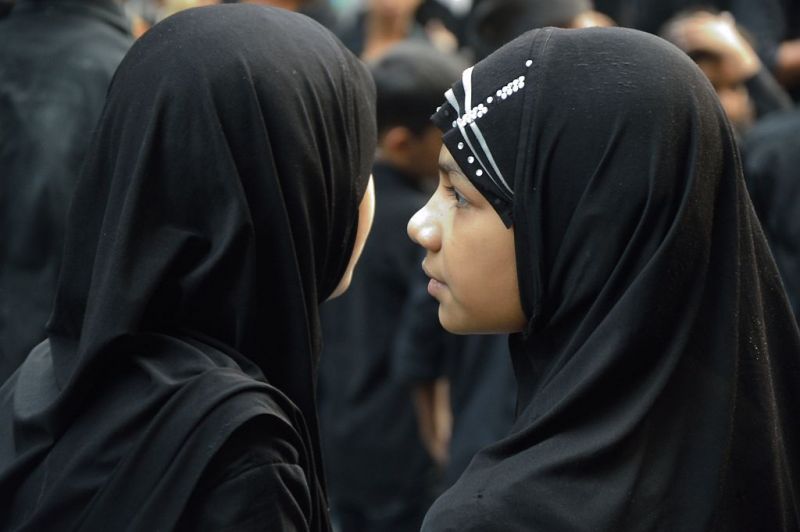By Apoorvanand
It is possible only in these times that even a sensitive scholar like Ramachandra Guha compares skull caps and burkas with trishuls (‘Liberals, sadly’, IE, March 20). To compare traditional, even obscurantist practices, with a violent campaign against Muslims and Christians is cruel, if not dishonest. The comparison is unfortunate as he is aware that burka-clad women are portrayed as a threat to open societies by anti-Muslim zealots and they have faced abuse and violence, not only in India but in other countries too.
It is sad that Guha fails to hear Harsh Mander (‘Sonia, sadly’, IE, March 17). Mander is making a simple point: Muslims are being told by our political movements, some of them espousing progressive causes, that “Muslimness” has no space in India’s polity.
To explain this secular concern, let me tell you a story about the electoral battle in Varanasi, where Arvind Kejriwal was contesting against Narendra Modi in the 2014 general election. Muslims attended Kejriwal’s rallies in large numbers. A senior AAP member, a sensible and secular scholar, told his friends that this open support from Muslims worried him for it was bound to repel Hindus.
During sectarian violence in Trilokpuri, in Delhi last year, we asked the AAP leadership to stand by the Muslims. We were told that elections were round the corner and it would not be prudent. Rahul Gandhi was criticised in his party for visiting Mohammad Akhlaq’s home to show solidarity with his family. A left-leaning friend told me that Lalu Prasad should have nominated an Extremely Backward Caste person or a Dalit for the Rajya Sabha, not a Muslim. In 16 years, Sonia Gandhihas not met Zakia Jafri, the widow of Ehsan Jafri, a Congressman killed in the violence of 2002.
Recently, we were in a public meeting in Rajsamand, where a Muslim was recently cut to pieces because the killer felt that Muslim men were a threat. Muslim speakers shied away from the topic and the local Hindu speakers talked about harmony. A senior Gandhian stressed the need for an anti-drug and anti-alcohol campaign. Another friend mentioned a case of violence against a woman (not a Muslim). The murder of a Muslim had to be placed in a wider frame of violence for it to be heard by Hindus.
It is this hesitation in our political and public culture which pains Mander. It is the invisibilising of Muslims and asking them to outsource their worldly concerns to secular Hindus. This is what Muslims have done all these years. Guha complains that that there is no secular or liberal Muslim leadership. But Indian Muslims have always cast their political lot with the secular parties. In all elections, every party barring the BJP has at one point or another received the support of Muslims. The case of Sadiq Khan, London’s mayor, is relevant here. In India, it is difficult to imagine secular parties choosing even a non-bearded, bare-headed Muslim as a safe candidate from a Hindu-dominated constituency. It is the same with Dalits and OBCs. Karpoori Thakur remained a backward-caste leader. Would Jignesh Mevani ever be accepted as a universal leader? Why is it that when a Muslim starts a political party, he is slotted as communal?
When we talk about leadership, it should not only be about politics. How many Muslims have been allowed to lead our academic or other institutions, including the media? I am not talking about the last four years. Is it our case that there were not educated or “cultured” Muslims? On the other hand, we have often heard the complaint that only Muslims are allowed to lead AMU or Jamia Millia. Well-meaning Hindu friends want Muslims to become individuals. It is interesting that the RSS also wants Muslims to shed their Muslimness. Their reluctance to be modern is seen as a reason for hatred. It is also ironic that while Muslims are asked to modernise, Hindus are being flogged for moving away from tradition.
Guha laments the absence of liberal leadership among Muslims. A community which has produced Ghalib, Nazir Akbarabadi, Zafar Jattali, Sir Syed Ahmad Khan, Qazi Nazrul Islam, Ruqaiya Sakhawat Hussain, Rashid Jahan, Sajjad Zaheer, Mahmuduzzafar, Ahmed Ali, Ismat Chughtai, Manto and others, who started talking about sexuality much before their “Hindu” counterparts, is asked to produce liberal leadership. If we look at the early communist movement, Muslim names abound. Can we imagine music and cinema without Muslims? Why are they not counted as liberals and leaders?
Years ago, Guha had voiced the same concern and a “liberal”, “persecuted” Dawoodi Bohra, Asghar Ali Engineer, had pointed out the problems with his argument. The fact that Guha is able to mention only two names as progressive Muslims shows that, like our mainstream media, he has a limited understanding of Muslim society.
Apart from all this, we need to emphasise that citizenship rights should not depend on our being liberal or progressive. A traditional, fundamentalist Hindu, Christian or Muslim has the same rights as an atheist, liberal or progressive. For Muslim women to qualify as democratic beings, they need not first shed their burkas.–The Indian Express
By Apoorvanand
(The writer teaches Hindi at Delhi University)
Courtesy: Muslim Mirror

